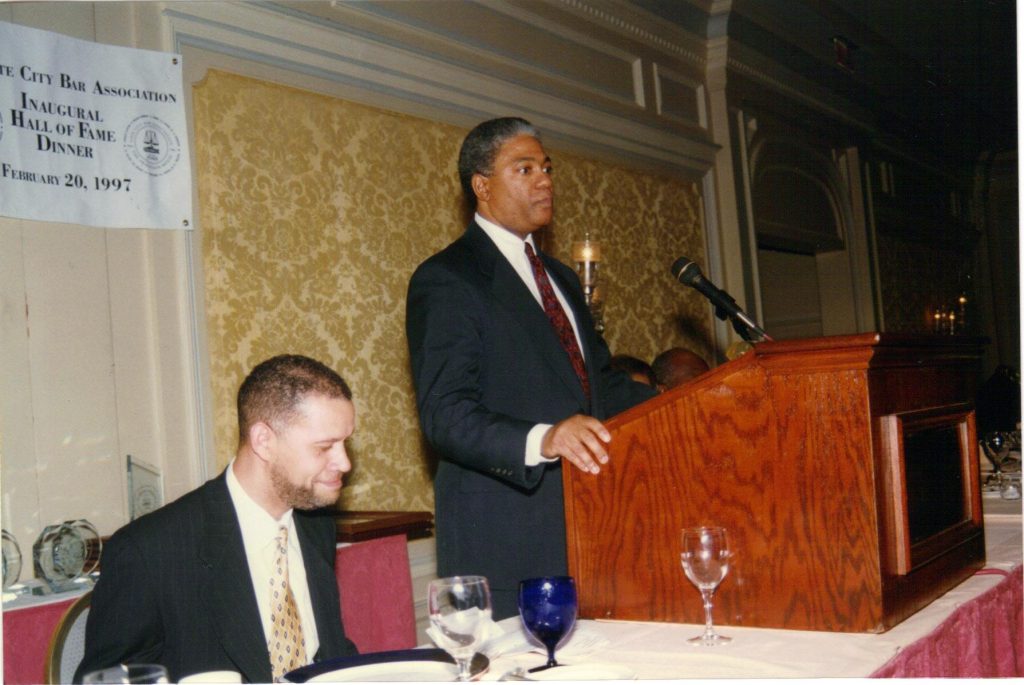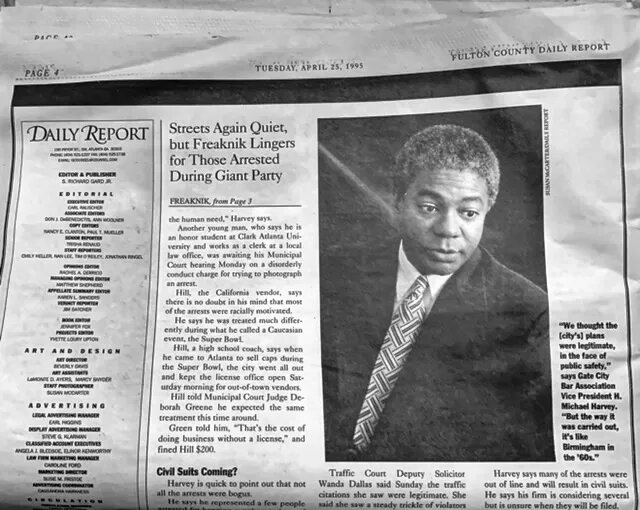
In Atlanta, the name Freaknik is associated with heavy traffic, music, and partying in the streets as seen in the recent Hulu documentary.
In its later years, particularly after the HBCU student event – along with its associated traffic and controversy – exploded in popularity around 1993, the city began to tighten its grip on what was allowed, more heavily enforcing traffic and drinking laws than it had in years past.�
In 1994, Mayor Bill Campbell announced that the city would begin to fight back against Freaknik, and that the Black college students who made their way to Atlanta annually would not be as welcome as they were before. But when it came time for Freaknik in 1995, Harold Michael Harvey worried that students wouldn’t heed the city’s warning.�
“I thought that the mayor’s announcement would catch the students off guard and that they would show up unaware that they would be subjected to repression from the police,” said Harvey, who was an attorney at the time. “I thought it was wrong to prohibit them from coming.”
In 1995, Harvey would spend his Freaknik weekend helping students who had been arrested. At the time, he was president elect of the Gate City Bar Association, the first bar association for Black attorneys in the state of Georgia. Before Freaknik came along that year, Harvey said he asked the association if he could organize a pro-bono project to represent any student charged with violating a city ordinance during the event, as long as it did not include guns, violence or drugs. According to Harvey, the association agreed, and many lawyers signed up to help when the project was initially announced. But when the time came, he was the only one who showed up.�
“I think they realized it wasn’t a popular thing to do,” Harvey said when asked why he thought no other lawyers came to help.�
A spokesperson for the Gate City Bar Association confirmed that Harvey was a past president, but did not say at what time. The spokesperson said the association’s records only go back 10 years, which is not as far back as would be necessary to find records about the pro-bono project, or which lawyers signed up to participate.
According to Harvey’s recollection of events, he helped roughly 180 students during Freaknik weekend in 1995, working throughout the event in an effort to make sure students could be back in school by Monday. In 1996, he said he worked with about 140 students, and about 100 in 1997. He said that most of the cases he took on were traffic violations, disturbing the peace, and, in some cases, felony assault on a police officer.�

The Atlanta Municipal Court did not have records or data available from the years 1995, 1996 or 1997,nor did The Fulton County Sheriff’s Office or the Atlanta Police Department.�
Harvey’s neighbor, City Solicitor Raines Carter, said he remembered Harvey’s work during Freaknik.
“Michael Harvey was one of the leaders in the legal community that recognized that the students needed representation,” Carter said in an emailed statement. “He organized a group of attorneys to help the students through the legal system. He displayed compassion for those that did not realize the impact that arrests and convictions could have upon their lives. His advocacy in court and in meetings to process negotiations proved to be just as valuable to the Solicitor’s office and the court as the students.”
Harvey said at the time, he found the city’s reaction to Freaknik to be overkill.�
“I thought that the police reaction was very oppressive,” he told Rough Draft. “It didn’t present a welcoming or a safe environment for the spring break festival participants.”�
Harvey said he doesn’t remember most of the names or circumstances of the people he helped, but one case did stand out to him. As Harvey remembers it, one young woman he represented was a senior in college and had applied to medical school. The police had blocked the exit that would take her to her hotel, and while she was sitting in her car trying to explain this to an officer, her car rolled forward and bumped him. Harvey said she was arrested for assaulting a police officer, but he was eventually able to get the charge reduced to disturbing the peace.
“I was particularly concerned about that, because here you had this smart young lady who wanted to be a doctor, who thought she would come to Atlanta to have a little fun,” Harvey said. “And here she is now, having to stand trial for a felony.”�
In 2019, Harvey wrote a memoir about his experience working during Freaknik called “Freaknik Lawyer: A Memoir on the Craft of Resistance.” He said he was motivated to write the book after he did research into his family history. In the process, he discovered a photo of his grandmother’s grandfather standing on a slave auction block in Hawkinsville, Ga. in 1847.�
After this discovery, the legacy of his family history began to unravel. According to Harvey, his grandmother’s grandfather and his younger brother escaped from a plantation and hid in a swamp to avoid detection for three years. They stayed there, Harvey said, until they learned that the original planter who bought them – one who had a nasty reputation – had gone ahead and sold them to a different planter out of frustration. The new planter had a more mild reputation, so the brothers turned themselves in and worked on that plantation until slavery ended.�
“I think that’s why I did it,” Harvey said of his work during Freaknik. “I just have this stubborn, unafraid thing in my DNA, that I didn’t know was in my DNA.”�
#Harold #Michael #Harvey #remembers #work #Freaknik

